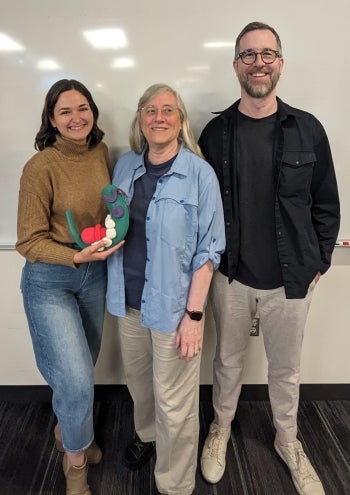ASU writing project team sees 6 instructors in a row win Teaching Excellence Awards

The Embryo Project Encyclopedia is an open-access, peer-reviewed publication on the science and history of embryology, reproduction and development. Students taking the Embryo Project Writing Seminar contribute to the publication. Courtesy photo
Teaching is difficult work — doing it well, even more so.
But instructors at the Embryo Project seem to have figured it out: Baylee Edwards, a PhD candidate in Arizona State University's Biology and Society program, is the sixth Embryo Project instructor in a row to win the Graduate Student Professional Association’s annual Teaching Excellence Award.
“I’m excited,” Edwards shares about winning the award. “It's really cool, and a good way to end my time teaching the class.”
This is Edwards’s fourth and last semester teaching the Embryo Project Writing Seminar, a small workshop-style course that builds students’ writing skills through a community space. In the course, students research and write articles on a scientific topic of their choosing to publish on the Embryo Project Encyclopedia, an open-access resource on the history and science of embryology, development, and reproduction that over three million people access each year.
The fact that students get to pick an article of their own choosing and have their work exist in the world, Edwards comments, is what “gets them invested in their own success.”
Esther Low, a biomedical engineering student enrolled in the course, feels that her writing skills have improved more in her semester taking the Embryo Project than in other classes.
“I’ve loved the course," she said. "It’s been challenging, because in other courses I’m not really taught how to write well. In (Embryo Project), I feel like I’ve grown in my writing skills in a structured manner, and I really understand how to take constructive feedback and apply it to my work.”
Rather than spending class time lecturing, instructors facilitate conversations between classmates about their peers’ work.
Edwards notes that such a structure is likely what has enabled instructors for the Embryo Project to be such good teachers: “EP positions instructors to interact with students in a unique way. You get to work with students one-on-one and see their progress over the semester. I think our care for the students comes out when we’re teaching, too. It’s a small class, so we get genuinely invested in the students.”
That investment in students does not go unnoticed.
“(Edwards) takes the time outside of class to give genuine feedback and cares about my growth as a student,” Low said.
Jane Maienschein, the head of the Center for Biology and Society, founded the encyclopedia and accompanying course in 2007, and has watched both evolve under new leadership since.
She emphasizes that it’s not only the nature of the course that brings in teaching awards, but the instructors themselves.
“Everyone who has taught it has innovated in new ways,” Maienschein said. “They’ve each added something new and important that has made the course accessible to different kinds of students. ... I may have invented the course, but it’s a totally different thing with every instructor.”
Prior to Edwards, five Embryo Project instructors have won the GPSA Teaching Excellence Award: Risa Aria Schnebly won the award in 2023; Dina Ziganshina-Leinhard in 2020; sisters Carolina Abboud and Alexis Abboud co-won it in 2018; and Erica O’Neill received it before that.
Maienschein notes that what makes Edwards stand out is her ability to facilitate conversations.
“What Baylee has really added is getting people to care about each other ... in the discussion, getting people to work as a group and a family — a community. Everyone contributes,” Maienschein said.
“Building community is important at a giant university,” she said. “I think it’s going to become harder and harder because there’s so much pressure on growth, especially in the sciences. ... Smaller classes where there’s camaraderie and learning together are really, really valuable.”
The value of a smaller class is not lost on Low.
“All my other classes are pretty huge, so I’ve greatly enjoyed having individualized feedback and being able to talk to instructors more,” she said. “In big classes ... I don’t get the kind of relationship with my professors that I do in EP.”
With Edwards leaving the Embryo Project to focus on her research with the RISE Center, her current co-instructor, Matthew Tontonoz, will take on the lead next.
While Tontonoz may have quite the legacy to carry on, Edwards isn't worried: “I have no doubt that Matt’s going to do wonderfully.”
More Sun Devil community

New ASU women's basketball coach has sights set on championships
Molly Miller apologized for being a few minutes late for her Zoom interview Sunday afternoon.No apology was necessary.It’s been a crazy and hectic 72 hours for Miller, who guided Grand Canyon…
SolarSPELL wins 'best in show' award at South by Southwest
Arizona State University professors from a variety of disciplines made a big splash at the South by Southwest festival of technology and culture in Texas earlier this month.The ASU SolarSPELL…

How 2 women who call each other 'sis' raised ASU running back Kyson Brown
The Lancaster High School graduation ceremony has just ended, and running back Kyson Brown poses for a photo with the two most important people in his life. ASU…


